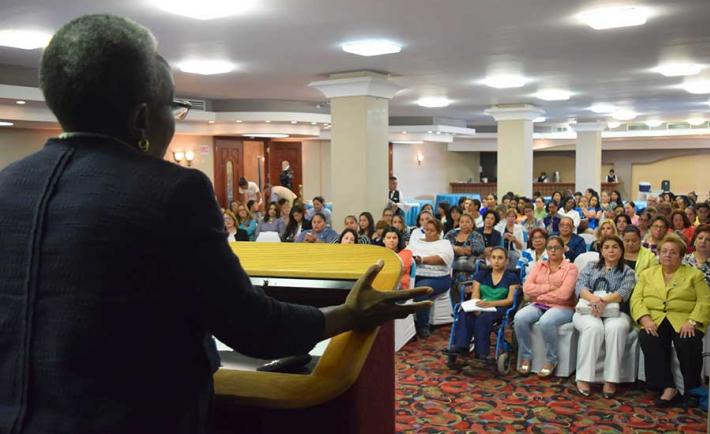
Sandra Pepera, NDI director for gender, women and democracy, presenting on Violence Against Women in Political Parties in Honduras
Political parties are the foundation of democracies. They are mechanisms for civic engagement and serve as entry points for individuals to engage in politics. As such, they can be especially important avenues for groups who have historically been excluded from the political process. Nearly always, women fall under this category. But while NDI’s experience from around the world confirms the importance of political parties for women’s route to elected political office, NDI has also learned that political parties are rarely supportive institutions for women.
While research indicates that there has been progress regarding women in politics and female candidates – the international average of women in parliaments nearly doubled from 1995 to 2015 – significant barriers to women’s engagement in politics, and within parties more specifically, remain. Violence against women is one of the highest barriers. As NDI’s #NotTheCost campaign reports, this type of violence is not limited to physical threats or assaults, rather, it encompasses a range of actions, policies and communications that are designed to control, limit or prevent women’s full and equal political participation. In the lead up to this year’s elections in Kenya, female candidates were not only discouraged and harassed, but robbed and physically beaten. This type of gender-based violence (GBV) is not unique to Kenya, nor is it contained in the region. Across the world, women in politics face levels of harassment, threats in person and online, and physical assaults that are not experienced by their male counterparts. In an example close to home, Congressional Candidate Kim Weaver withdrew her candidacy for Iowa’s Fourth Congressional District after receiving death threats.
Because of the vital role of parties within the political process, identifying and eliminating violence against women within these political institutions is imperative for healthy, inclusive government. However, the very nature of parties makes this internal violence a difficult phenomenon to address. For example, NDI notes that parties are “protected public spaces,” often sitting removed from the laws on harassment and discrimination that guide behaviour in other public institutions. Further, parties strive for unity and loyalty to their platform and to other members in the face of political opposition in the same national jurisdiction. This emphasis - as well as rewards for perceived loyalty - serves as a deterrent for reporting abuse, discrimination or assault. And, most parties have no internal grievance body or dispute mechanism to speak of. The consequential lack of accountability for perpetrators then reinforces gender inequality within parties. This in turn has a negative impact on women’s experience of politics, causing increasing numbers of women to stand as independents - where parties are strong gatekeepers, this is often an exercise in futility - or to leave politics altogether.
The Gender, Women and Democracy team (GWD) at NDI has embarked upon a project to document and address these occurrences. Taking the opportunity provided by NDI’s recent review of political party strengthening, GWD is revising NDI’s long-standing Win With Women political party assessment tool, including by adding program guidance on dealing with the violence that women party members face within their parties. We are working with dedicated regional teams on pilot projects in Tanzania, Côte d'Ivoire, Tunisia and Honduras to illustrate the global nature of this type of violence and present opportunities for action to address it. In these countries, we have partnered with parties who have volunteered to engage with our pilot programs. By speaking to party leadership, conducting surveys of party members and leading focus groups with women in the parties, we hope to present a comprehensive view of the challenges facing women within their own parties. Importantly, we are taking this data and analyzing it to create party- and country-specific recommendations to support intra-party dialogue on ways to improve accountability for incidents of violence against women, and to strengthen women’s roles in the political process more broadly.
In my capacity as a GWD Project Assistant, I have had the opportunity to work closely with several of our pilot countries as they transition from data collection to analysis and recommendations. In many ways, it has been encouraging to witness the willingness of parties to work with us on the subject, though it has also been sobering to read the testimonies of women from Southern Africa to Central America who persevere within party politics despite harassment, threats and glass ceilings.
Our pilots are now moving towards the recommendations for action stage, which will be a test of the will of parties to address the issues they have worked with us to document. Though I have left NDI to begin graduate studies at Georgetown University, I will certainly be eagerly watching for the results of these interventions. I hope you will do the same.
